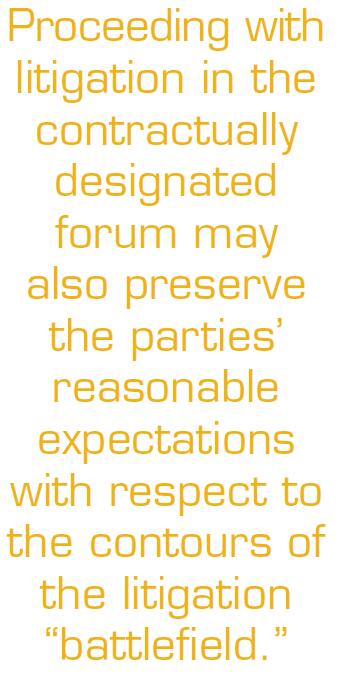Maneuvering to Terrain: Enforcement of Forum-selection Clauses After Atlantic Marine
| Publication year | 2014 |
| Pages | 0229 |
| Citation | Vol. 75 No. 4 Pg. 0229 |

Philosophers of war, Sun Tzu and Carl von Clausewitz, espoused the importance of using terrain in waging battle. Sun Tzu described "[t]he natural formation of the country" as "the soldier's best ally."1 Clausewitz explained the significance of terrain in defending against attack: "defense is nothing more than a means by which to attack the enemy most advantageously, in a terrain chosen in advance, where we have drawn up our troops, and have arranged things to our advantage."2 The Army Doctrine Publication discusses as a "core competency" the principle of maneuver to be applied in moving to and fighting on desirable terrain:
Combine arms maneuver is the application of the elements of combat power in unified action to defeat enemy ground forces; to seize, occupy and defend land areas; and to achieve physical, temporal and psychological advantages over the enemy to seize and exploit the initiative. It exposes enemies to friendly combat power from unexpected directions and prevents an effective enemy response.3
Predictable results followed for battlefield commanders who well-applied the principle of maneuver to fight on favorable terrain. King Leonidas with the Spartans at Thermopylae is one example, but there are many others. While the real-life consequences of effective or ineffective use of maneuver and terrain are obviously different for the soldier and the lawyer, maneuver and terrain are no less significant in shaping the battlefields and affecting outcomes for both professionals.
Lawyers often rely on forum-selection clauses when trying to maneuver to more favorable territory. Federal courts took divergent approaches to enforcing forum-selection clauses for decades, but the United States Supreme Court significantly clarified the law in this area in its December 3, 2013 opinion in Atlantic Marine Construction Co., Inc. v. United States District Court for the Western District of Texas ("Atlantic Marine")4 . The Supreme Court in Atlantic Marine adopted a set of rules for enforcement of forum-selection clauses that is consistent with the relevant procedural rules and the federal policy favoring enforcement of forum-selection clauses, but in doing so, overruled precedent from the Eleventh Circuit and other federal circuits. This article briefly explains how Atlantic Marine has changed the law on enforcement of forum-selection clauses, possible effects of the decision on litigation strategy and questions that remain after Atlantic Marine.
Enforcement of Forum-Selection Clauses before Atlantic Marine

Forum-selection clauses have been used by contracting parties for decades to ensure greater predictability in litigation and to steer litigation to tribunals experienced at adjudicating the types of disputes anticipated. Forum-selection clauses may also give a litigant a strategic advantage by directing litigation of both contract and tort claims to a more convenient forum. Enforcement of a forum-selection clause may affect the procedural rules applicable to an action and, because the contractually designated forum will apply its own choice-of-law rules, may also affect the applicable substantive law. Enforcement of a forum-selection clause, for example, may prevent the plaintiff from flouting the statute of limitations in the contractually designated forum. Proceeding with litigation in the contractually designated forum may also preserve the parties' reasonable expectations with respect to the contours of the litigation "battlefield."
Forum-selection clauses were once void as against public policy. In 1972, however, the United States Supreme Court in M/S Bremen v. Zapata Off-Shore Co. ("Bremen")5 held that forum-selection clauses were presumptively enforceable in admiralty and lower federal courts, and state courts have since applied Bremen to disputes arising outside the admiralty context. Alabama courts continued to refuse to enforce forum-selection clauses for 25 years after Bremen,6 but in 1997 the Alabama Supreme Court overruled that line of authority and adopted the Bremen approach in Professional Insurance Corp. v. Sutherland ("Sutherland").7 Under both Bremen and Sutherland, a forum-selection clause is prima facie valid and enforcement will be denied only in limited cir-cumstances,8 such as when the clause is "affected by fraud, undue influence, or overwhelming bargaining power"9 or when the clause violates the strong public policy of the forum.10
In the years following Bremen, litigants in federal court used a variety of procedural vehicles to enforce forum-selection clauses. Defendants could seek dismissal under Federal Rule of Civil Procedure 12(b)(3) ("Rule 12(b)(3)") for a plaintiff's choice of an "improper venue" or similarly request dismissal or transfer under 28 U.S.C. § 1406 ("Section 1406") for a plaintiff's choice of a "wrong" venue. Defendants could also have an action transferred under 28 U.S.C. § 1404(a) ("Section 1404") to the contractually designated forum. Under a motion to dismiss, enforcement of forum-selection clauses was mandatory, assuming the clause was valid and enforceable. This rule followed from Bremen, which involved a motion to dismiss for forum non conveniens.11 In contrast, as the Supreme Court explained in Stewart Organization, Inc. v. Ricoh Corp. ("Stewart"),12 if a defendant sought transfer under Section 1404(a) to enforce a forum-selection clause, a district court would weigh various interests and exercise discretion in deciding whether to transfer an action to the contractually designated forum.13
Dicta in Stewart created confusion over whether Rule 12(b)(3) or Section 1406 could be used to enforce forum-selection clauses. Stewart noted that "[t]he parties do not dispute that the District Court properly denied the motion to dismiss the case for improper venue under 28 U.S.C. § 1406(a) because respondent apparently does business in the [district where the plaintiff filed the action]."14 Following Stewart, several circuits held that Rule 12(b)(3) and Section 1406(a) could not be used to enforce a forum-selection clause that designated a federal forum because venue was not "wrong" or "improper" when the requirements of the relevant venue statute15 were satisfied, regardless of whether a forum-selection clause required litigation in a different forum.16 Some of these courts, however, held Rule 12(b)(3) or Section 1406 could be used to enforce a forum-selection clause that designated a non-federal forum since there was no procedural mechanism to transfer an action from a federal court to a non-federal forum.17 Other circuits, including the Eleventh Circuit, held that an action could be dismissed for wrong or improper venue to enforce a forum-selection clause, regardless of whether the clause designated a federal or non-federal forum.18
Courts have also relied on other procedural rules to enforce forum-selection clauses. Some courts have held that a forum-selection clause may be enforced through a motion to dismiss under Rule 12(b)(6).19 One district court has even held that a forum-selection clause could be enforced through dismissal for lack of subject matter jurisdiction under Rule 12(b) (1),20 but the Eleventh Circuit ultimately rejected that approach.21 Some courts have also enforced non-federal forum-selection clauses through dismissal based on common law forum non conveniens.22
The differences between a dismissal and transfer could have significant consequences. A dismissal could end an action if the statute of limitations had already run, but it could also give a plaintiff an opportunity to add a non-diverse party in an effort to prevent removal after refiling in state court. Under a motion to transfer under Section 1404(a), it was also possible that a plaintiff whose claims were time-barred in the designated forum could sue in a state with a longer statute of limitations and have that limitations period applied following transfer to the designated forum.23
The Atlantic Marine Decision
The decision of the Fifth Circuit in In re Atlantic Marine Construction Co., Inc.24 illustrated the confused state of federal law on forum-selection clauses. In that action, J-Crew Management, Inc. sued Atlantic Marine Construction Co., Inc. in a Texas federal court despite a forum-selection clause that required litigation in Virginia.25 Atlantic Marine moved to dismiss under Rule 12(b)(3) and Section 1406 or, alternatively, to transfer the action to a Virginia federal court under Section 1404(a). The district court denied the motion, holding that Section 1404(a) was the correct mechanism for enforcing the clause but that Atlantic Marine had failed to show that interests weighed in favor of transfer.26 In denying Atlantic Marine's mandamus petition, the Fifth Circuit adopted the minority approach and held that a clause that designates a federal forum cannot be enforced under Rule 12(b)(3) or Section 1406 if venue is correct under the relevant venue statute.27 The Fifth Circuit maintained that a Rule 12(b)(3) dismissal remained the correct mechanism for enforcing a clause that designates a state, foreign or arbitral forum because there is no procedural mechanism for a federal court to transfer to a non-federal forum.28 The court cited no textual basis for treating federal forum-selection clauses differently from non-federal clauses. The Fifth Circuit then held that the district court did not clearly abuse its discretion by placing the burden on the party seeking enforcement of the forum-selection clause and by treating the inconvenience of the plaintiff as a relevant consideration.29 The Supreme Court granted certiorari.
The Supreme Court significantly clarified the law regarding enforcement of forum-selection clauses while adhering to the text of the relevant procedural rules...
To continue reading
Request your trial
